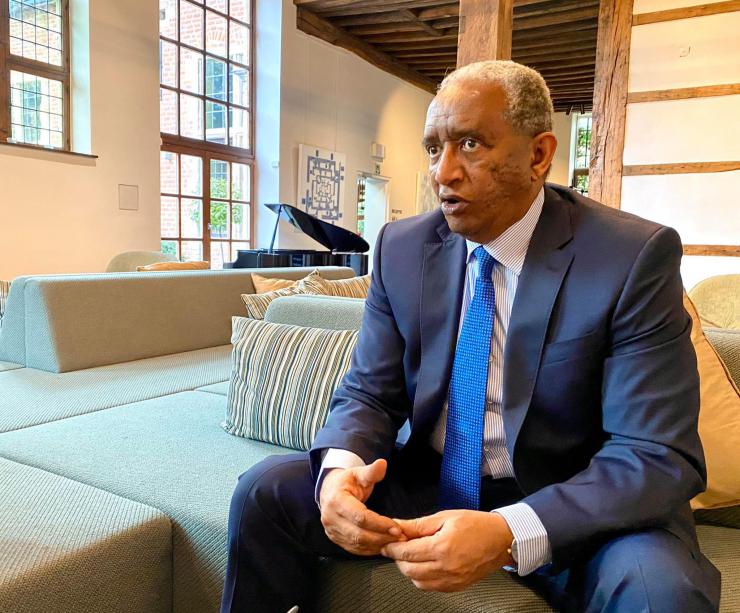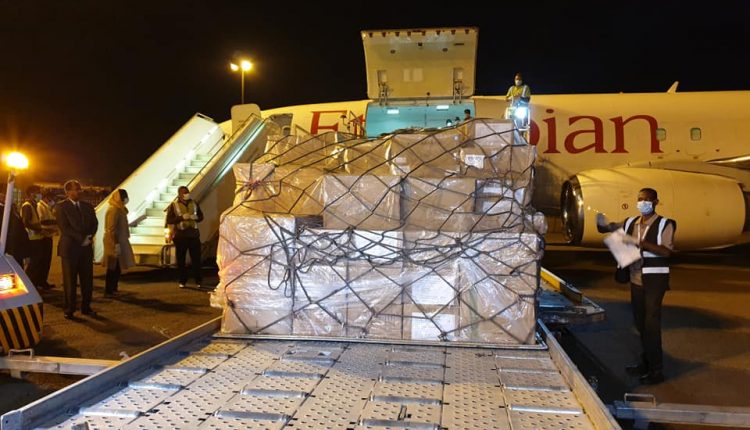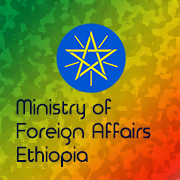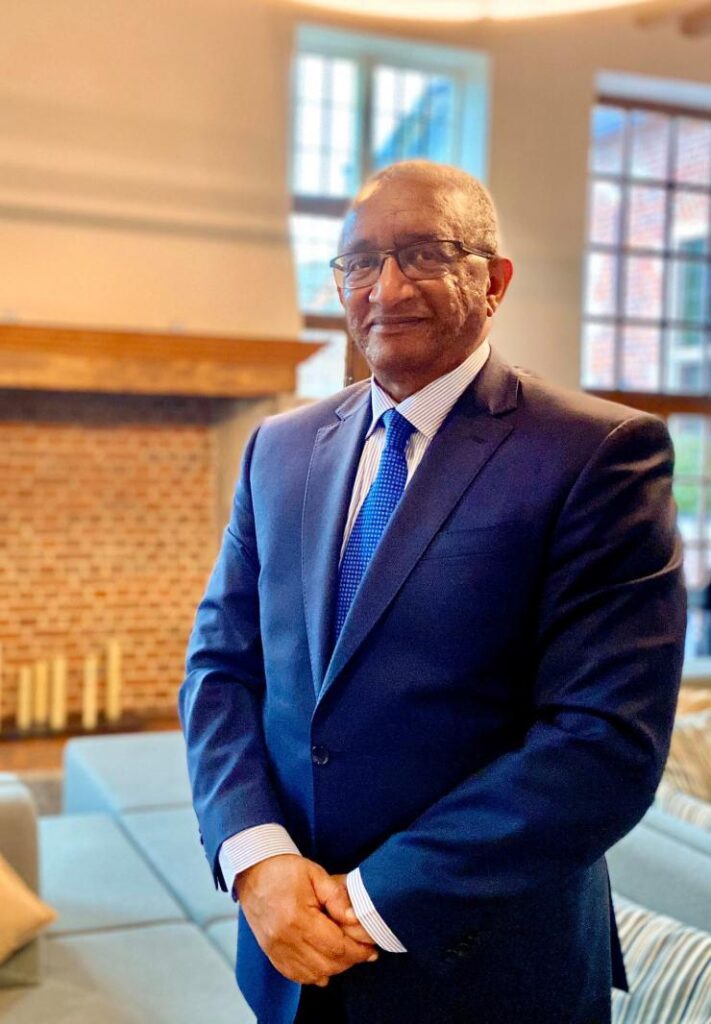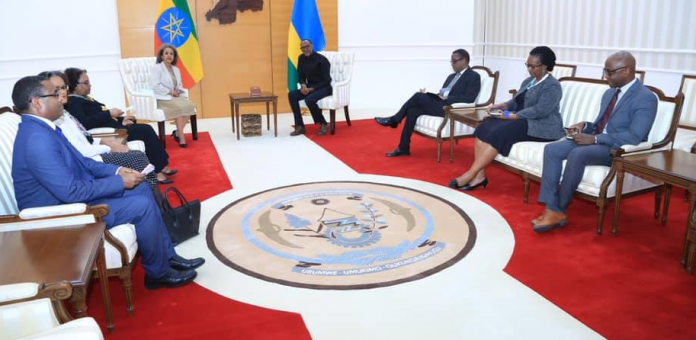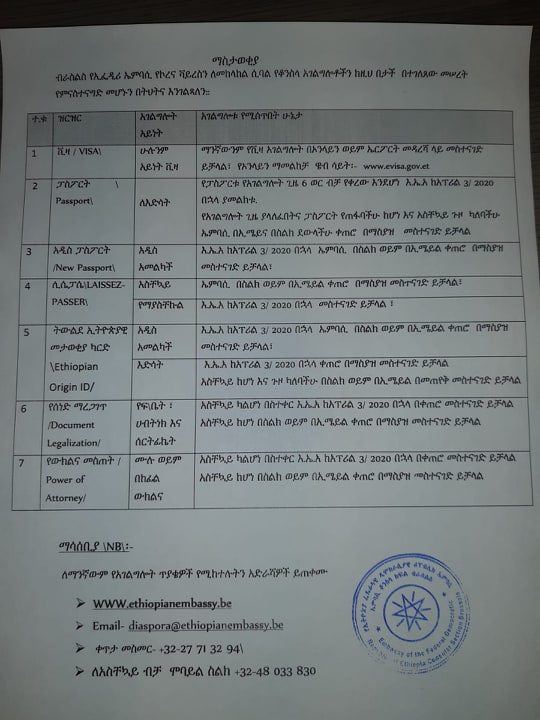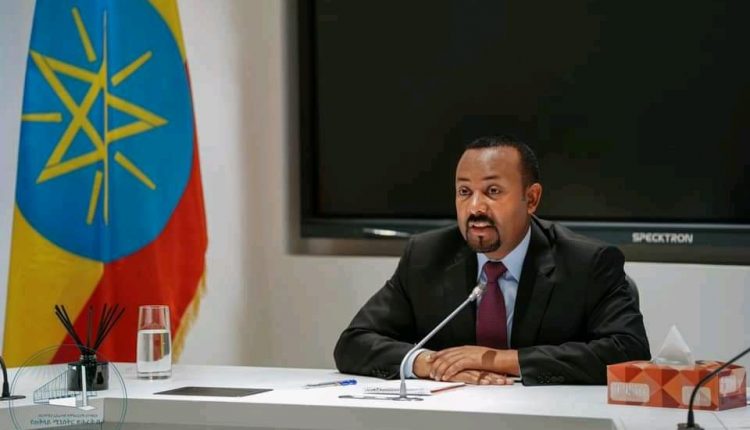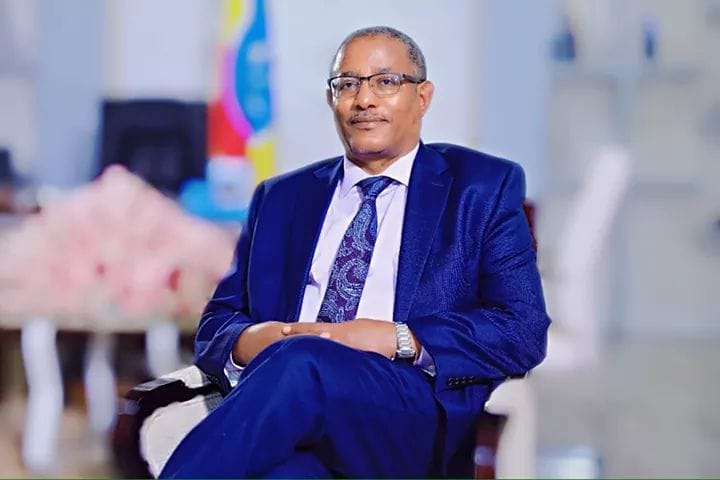
After delivering a lecture at the KU-Leuven (Catholic University) on Ethiopia’s socio-economic development and peace, H.E. Ambassador Grum Abay, Special Envoy, Extraordinary and Plenipotentiary of the Federal Democratic Republic of Ethiopia to Belgium, Luxembourg and E.U. institutions sat down with a journalist from VETO, an independent student magazine, and discussed about various issues. Here is an excerpt from the interview.
Question: –
How do you stay loyal to a regime which has known three very different ideological paradigms?
Answer: –
Grum Abay: ‘It all starts with the responsibilities of a civil servant. A civil servant is a person who is employed or positioned to serve the government of the time. Each regime has its own foreign policy. If I am to be the person to implement that foreign policy, I will have to remain true to two things.’
‘One, I have to accept the fact that that specific government has become my country’s government at that time. There is nobody else. So as long as history has given the opportunity to that government to rule my country, I will serve that government. But not in the sense that I will blindly follow whatever is done by that government. My job is to advise, to indicate better ways of implementing the foreign policy of that government. But the decision is theirs. Period.’
‘A second thing is, I personally never have been engaged in any political activity or belonged to political parties within Ethiopia. I’m a free person politically speaking. That gives me the opportunity to be myself. My own person. But, an Ethiopian also. Me, as an Ethiopian diplomat, I should know how to pursue the interests of my country.’
‘The vital principles of a country’s foreign policy do not change with changes of a regime. Territorial integrity, the security of your country. The economic wellbeing of your country, such goals never change. The strategic importance, this doesn’t change. Whoever comes to rule in Ethiopia, these things never change. You try to stay true to those principles.’
Question: –
And what if a regime calls upon policies that go against these vital interests of the people? What do you do?
‘Then you leave. Period. I mean it is as simple as that. But you have to understand also that if you leave, you’re giving the detractors in that government a chance to cause more damage. By staying, you are actually making sure that they’re not making more of a mess. So, it’s better to stay and fight, instead of leaving.’
Question: –
How is it possible that Meles Zenawi, the PM from 1995-2012, was loved by the people, despite the many infractions on human rights during his reign?
Answer: –
‘Meles Zenawi was, in my own personal opinion, a very intellectually astute person. He had a very great intellect. And, I think he was also one of the greatest political strategists that Ethiopia has ever seen. That’s not easy. For a country like Ethiopia with more than seventy various ethnic groups, different types of political goals, needs, aspirations, it’s not easy.’
‘So you have to know how to navigate these various interests, how to coalesce them without jeopardizing on the one hand, the stability of the country, at the same time the continued economic development of the country. It’s not easy.’
Questions: –
‘He came up with this idea of a Developmental state. What is developmental state?
Answer: –
It basically means: A poor country like Ethiopia first has to develop its economy. In developing its economy, the government or the state will interfere in those major strategic economic sectors, to build a critical mass that could serve as a basis for industrialization, improved output in agriculture, avail the necessary infrastructure. The basis for investment. The basis for energy generation. In a nutshell, the developmental state means that the government will be the major investor in the economy for a certain period of time, but paving the way for the private sector to take over in the economy of the country.
‘Through public investments, it will be creating the conditions for an economic environment conducive for the economy to continue to grow. Also creating jobs for the youth. We failed in creating jobs for the youth. The economy had grown in leaps and bounds. But we were not in a position, for all the investments that the government made, all the investment that we had from outside, we were not able to create the jobs that were needed for the multitude of young people, that were seeking jobs.’
‘That on top of the absence of political liberties. Actions that were against respect for human rights. Other actions, corrupt actions within governmental institutions and state apparatus, political and religious persecutions. On top of the economic problems, on top of the jobless youth; You add this and it became a powder cake. It became a Tinderbox. It became explosive.’
‘So we knew that whatever the developmental state project has provided Ethiopia with, it has ended now, because it was not able to produce what it was supposed to produce at the end of the day, both politically speaking and economically speaking. That is why now we are in a reform mode, in trying to maintain what we have had through the developmental state system and build on that, minus its excesses.’
Questions: –
How was it possible for Ahmed Abiy, in the meantime Nobel Prize Winner for Peace, to appear so sudden at the forefront?
Answer: –
‘Because Ethiopia could no longer move forward through the old ways of doing things. Abiy Ahmed is a new generation politician. He’s young, he’s only 43. All other Ethiopian politicians are more or less in or around their seventies. They are from yesterday. They might not be in a position to understand today’s problems. The problem is these old politicians kept yesterday’s problems and brought them to be today’s problems. And it fell on Abiy Ahmed to resolve this.’
‘Abiy is trying to do his best in the sense that he understands Ethiopian problems as a member of the younger generation. That’s why he has the courage to introduce new reforms. While the older generation could not have the courage, because they also have their own problems and instigated these problems. You can’t be the person who started the problems and be the person to solve it. It’s either one or the other’
Question: –
Yet, we have had in 2018-19 under Abiy also one of the largest internal displacements in the south of Ethiopia.
Answer: –
But is that his problem? I don’t know. Such problems existed before his time. What I’m saying is that, Abiy has introduced both political and economic reforms. What do I mean by political reforms? I mean: you open up the political space for every type of political opinion to be aired in Ethiopia. Nobody’s opinion gets banned, except political opinions that impinge and widen intentionally differences in religion and ethnicity in Ethiopia and on the sovereignty of Ethiopia. Apart from that you can say, you can write, whatever you want obviously under the laws of the country. This is new for Ethiopians. Do you love dogs?
Journalist: – Yes, I do (laughs).
Answer: –
‘You have your dog chained for a day and in the evening, you let it out. It will run, run because it’s happy. Because it’s been chained the whole day. It’s just like that. All those political parties that have been curtailed from functioning, all of a sudden they found themselves to be free.’
‘Some, they really do not know how to use correctly their new freedoms and they abuse it. Others, they are scared to use it because they still don’t know how. The first one is extreme, the latter a negative one. And it’s uprooting the people. Because political liberalization, unfortunately, brought with it unwanted results.’
‘You have a room that was closed for ten years, the windows and the doors were shut. You open it: bad smell comes out because there wasn’t any air inside. You open the political space: some bad politics comes out.’
‘It’s the same thing and bad politics means people who do not know how to use their new freedoms in a correct way. That means that political mobilization along ethnic lines, this ethnic group says, you are not from my ethnic group so you have to leave my place, my land, that’s something new for Ethiopia and this should not be continued and it will not be continued, because even though we might come from various ethnic groups, we all are Ethiopians.
‘Lately, we have returned all those who were uprooted back to their original places. We have returned all of them. Secondly, in the past few months, I am personally witnessing the decrease in political violence in Ethiopia, and that’s why when I say the upcoming august 2020 elections, will be a test for Ethiopia’s new political paradigm.’
Question: –
So you are actually saying that it’s a process that takes time to get used to the democratic system? It will take time, no matter what.
Answer: –
We will continue with the policy, yes. Because other alternatives, we’ve seen them! They did not work.
Question: –
Human Rights Watch is saying that arrests are getting arbitrary again.
Answer: –
‘Yes, Amnesty International has been writing that, International Crisis Group has been writing that, Human rights watch is doing the same. Yes. Well you know. One has to see things in context, you cannot expect – and this is my personal opinion – that a country like Ethiopia that used to use its anti-terrorism law to imprison journalists, to persecute and harass political opponents, changes instantly.’
‘The anti-terrorism law meant harshest penalties. That law was promulgated for terrorists, but in Ethiopia we were considering political opponents as terrorists. They were taken to jail, to court, based on the anti-terrorism law. Not on the Penal code of Ethiopia. That was drastic!’
‘So, now, political activities as I said earlier, some of them are extremist. In the sense that they really don’t know how to moderate their enthusiasm of new found political freedoms. They go overboard. And that means, they step on somebody’s toes. That means in that case you have to use the law. But using the law takes time.’
‘Because we have been re-introducing new human rights respect mechanisms. You have to renew the institutions, you have to renew the courts. That takes time. And sometimes bad habits, stay long. These, in my view, are episodes here and there. But then, regarding the receiving end, I mean, those who have been imprisoned, probably might use the reasons for their imprisonment as something political.’
‘Let me tell you, political party members, opposition party members, when arrested they say: we are arrested because we are political opponents. It takes two to tango. All I’m saying is: there are certain things that we have to handle better.’
Question: –
One of the parties with whom Ethiopia is struggling is the Oromo Liberation Front (OLF). Actually, you are saying that Ethiopia doesn’t know yet how to deal with such extreme parties.
‘There’s a culture in Ethiopia – Ethiopia is a very old country – especially in the highlands, on the countryside or the rural areas; when a boy reaches the age of fourteen or thereby, you know what his father gives him? His father gives him a rifle. What does that mean? That means don’t waste your time by dialoguing. Just blow the enemy away.’
‘Now, if that’s the mentality, can you imagine how it will be when it comes to political discourse. Meaning: we are still yet in the learning stage of political dialoguing between us. In the Ethiopian political landscape, it is a win or lose game up to now. It was difficult for opposing parties to live together. Either of them had to be eliminated, in most cases, physically. That was the political landscape.’
‘So now, whatever we see, whether with the OLF or with others, it happens. On one hand, as I said earlier it is something of a political maturity that each political party should have in the way that they are carrying out there political activities not to the detriment of the country itself. But some of them are acting to the detriment of the country as a whole.’
‘On the other side, you cannot continue to use force, to subdue every political opposition that comes your way. So, what I see, whether the OLF or the other, it is something that is temporary; it’s something provisional. It’s something that’s going to calm down.’
We’ve only started with these reforms two years ago. And as I said: everything has come out now. And it is not something that might not be mellowing down in a short period of time. Mind you, the Ethiopian state is a powerful state. I mean, we can immediately clamp down on everybody, but that would be doing the same old thing that we were doing and that did not come up with the needed results’
Question: –
How does Ethiopia want to play a role as the motor of Africa, now that the African Union (AU) seems to be working more closely together than previously?
Answer: –
‘Well, the African Union has a strategy called “Agenda 2063”. That means by 2063, we Africans would like to see a better Africa in every aspects of development, political, security, economic, sustainable development. Social emancipation and gender equality. And now, the new agenda of climate change and clean energy.’
‘We, as Ethiopia, as a founding member of the AU, we’ll play our part, especially in the Horn of Africa region where we belong with regards to the maintenance of peace and security and economic integration there. If we have in the Horn of Africa region, political stability, peace and security established to a certain extent, economic integration established together with East Africa among the member states of the Horn of Africa region, which consists of more than 400 million people market in that area alone. Can you imagine if economic integration works, what kind of a market that will be?’
‘Even now, in Ethiopia there are more than 100 million people. The Ethiopian domestic market is big. Why are the Chinese and others coming? They see the market. They see the possibility of a growing consumer market. People have money now; they can buy. That’s why economic integration, peace and security, political stability are critically important for the Horn of Africa and at the same time for the African Union, to attain its 2063 goals at the end of the day. So Ethiopia will commit to do its part as it has always done.’
Question: –
Do African leaders look at Abiy as a catalyst figure?
Answer: –
They like him. Many of them look at him as their younger brother. Because most of them are much older (laughs).
Question
How do you as an experienced diplomat and ambassador to the EU look to the recent summit between the EU- and AU-commissions?
Answer: –
‘The European Union would like to have a continental partnership with the African Union. The European Union, as a continental Union would like to continue its engagement with African countries not leaving behind bilateral relations, but a continent to continent relation with Africa. Because the AU is becoming a much more active organisation, especially in the maintenance of peace and security in Africa, while honestly, it’s a bit lagging behind in the economic part of it. Because at the end of the day, money is important, and the AU doesn’t have money.’
‘But in the peace and security area it is becoming more and more of an international partner, both for the UN and for the EU. African soldiers are actually the ones keeping and maintaining peace and security inside Africa, even though financially they are supported to a large extent by the EU and the UN. The flesh and blood is African flesh and blood. Those who die are African soldiers. The peace and security area is one of the areas in which I think will continue to be a very prominent subject between the EU and the AU. And then, obviously for the African side, it’s the economic integration, investment and job creation.’
Question: –
But there are also departments in which you differ, take for example the sensitive subject of migration.
Answer: –
‘The migration issue, we look at it from a different perspective. The European Union, because of its member states’ positions with regard to migration, is forced as a Commission and as a Union to look at the migration issue with such a big importance. But, when it comes to Africa, how many Europeans understand that it’s only 6% of Africans illegally emigrating to Europe? 6% percent. I personally don’t understand why it’s a big deal in our engagement between the EU and the AU. Because, it’s 6%.’
‘There’s much more migration within Africa itself. Much more. The figures show clearly that it should not be a major issue in our dealings with Europe. Because we are not the ones that are contributing for 70% or more of migrants here. Those are other countries. We should not be made to focus on something that we are not contributing to for a huge percentage of the problem.’
Question: –
What would you advise KU Leuven students who want to study in Ethiopia?
Answer: –
‘Enjoy their time. I mean the Ethiopians are – and I keep repeating this – we are a very old people you know? For us, a guest is a guest. Europe has lost that tradition. The West has become selfish, in many ways. It’s only you, it’s your life, it’s your car, it’s your house. It’s you. But what about your neighbor?’
‘We have a saying: “When your neighbor’s house is burning, you better help him by dowsing it with water.” Because tomorrow your house will be burning and if you haven’t helped him, he will not help you. Ethiopia is more of community. It’s a mentality an idea of ‘we are all one people’.’
‘Selfish tendencies, individualistic tendencies, of course they’re cropping up now, with money coming in, but basically, especially when you go to a farmer’s house in the countryside and he knows that you are a guest, or a passer-by and you ask if you can stay at his house for the night, he will leave his bed for you. And he will sleep on the floor. He will leave his bed for you!’
‘But you know, they can just enjoy the country, people are nice (laughs).’
